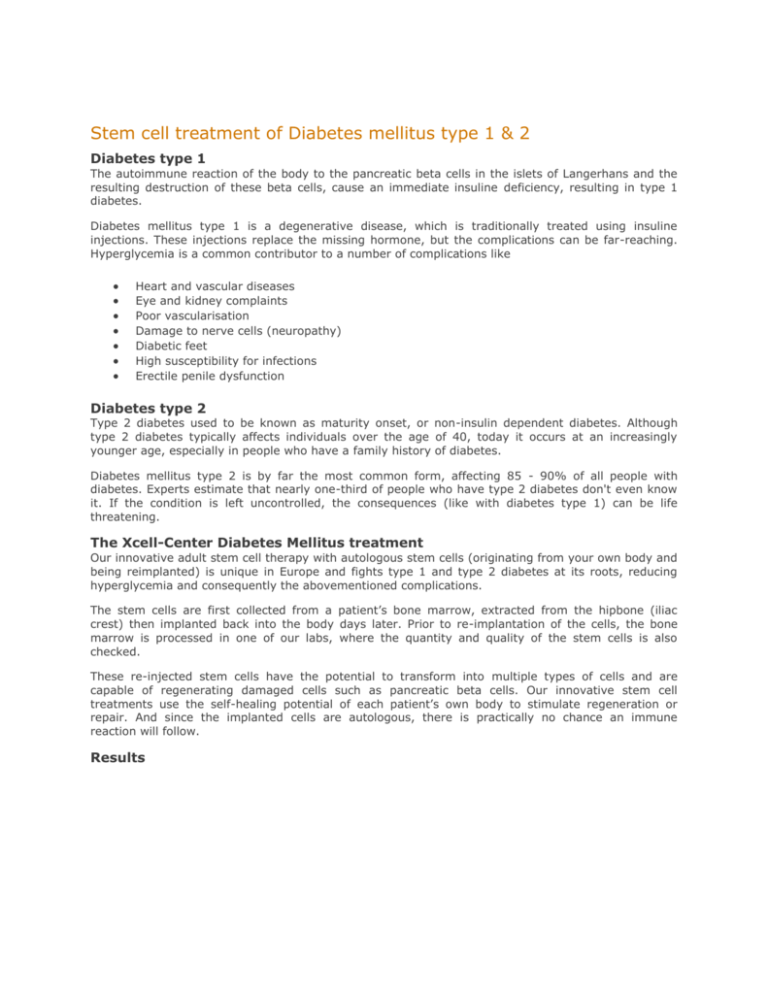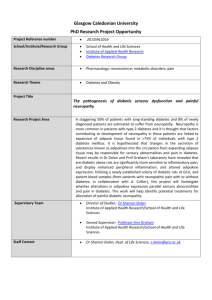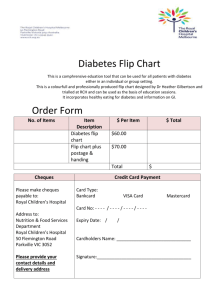Stem cell treatment of Diabetes mellitus type 1 & 2 Diabetes type 1
advertisement

Stem cell treatment of Diabetes mellitus type 1 & 2 Diabetes type 1 The autoimmune reaction of the body to the pancreatic beta cells in the islets of Langerhans and the resulting destruction of these beta cells, cause an immediate insuline deficiency, resulting in type 1 diabetes. Diabetes mellitus type 1 is a degenerative disease, which is traditionally treated using insuline injections. These injections replace the missing hormone, but the complications can be far-reaching. Hyperglycemia is a common contributor to a number of complications like Heart and vascular diseases Eye and kidney complaints Poor vascularisation Damage to nerve cells (neuropathy) Diabetic feet High susceptibility for infections Erectile penile dysfunction Diabetes type 2 Type 2 diabetes used to be known as maturity onset, or non-insulin dependent diabetes. Although type 2 diabetes typically affects individuals over the age of 40, today it occurs at an increasingly younger age, especially in people who have a family history of diabetes. Diabetes mellitus type 2 is by far the most common form, affecting 85 - 90% of all people with diabetes. Experts estimate that nearly one-third of people who have type 2 diabetes don't even know it. If the condition is left uncontrolled, the consequences (like with diabetes type 1) can be life threatening. The Xcell-Center Diabetes Mellitus treatment Our innovative adult stem cell therapy with autologous stem cells (originating from your own body and being reimplanted) is unique in Europe and fights type 1 and type 2 diabetes at its roots, reducing hyperglycemia and consequently the abovementioned complications. The stem cells are first collected from a patient’s bone marrow, extracted from the hipbone (iliac crest) then implanted back into the body days later. Prior to re-implantation of the cells, the bone marrow is processed in one of our labs, where the quantity and quality of the stem cells is also checked. These re-injected stem cells have the potential to transform into multiple types of cells and are capable of regenerating damaged cells such as pancreatic beta cells. Our innovative stem cell treatments use the self-healing potential of each patient’s own body to stimulate regeneration or repair. And since the implanted cells are autologous, there is practically no chance an immune reaction will follow. Results In the bar graph below you can see the results of a survey of 23 of our diabetes (type 1 and type 2) patients, results up to January 2008. The survey was conducted one to six months after the treatment. Three out of 23 patients reported no change in use of medication or feeling of well-being after the treatment. Ten out of 23 patients reported a reduction of 25% - 50% of use of insulin and/or oral antidiabetics and a perceived improvement of well-being. Their HbA1c level was the same or had improved (lowered). Ten out of 23 patients reported a strong improvement, with a more than 50% reduced use of insulin and/or oral anti-diabetics. No severe hypoglycemia was reported. Some patients reported a closed leg ulcer. Their HbA1c level was the same or had improved (lowered). They reported a big perceived improvement of well-being and an almost complete absence of pain. No patients reported a measurable or perceived deterioration of the quality of their life (regarding usage of medication, pain or feeling of well-being). Of these 23 patients, nine suffered from (poly)neuropathy. The following bar graph shows that one patient felt a reduction of neuropathy, while eight patients felt a marked reduction of their neuropathy, being almost or entirely pain-free. Cost The cost of the treatment depends on the method of cell application. An XCell-Center doctor will evaluate the medical records and blood work of a prospective patient to determine which application method would be most appropriate. The price of the angiography treatment is 8,925 Euros. The price of the direct injection treatment is 7,545 Euros. http://www.xcell-center.com/treatments/diseases-treated/diabetes.aspx







